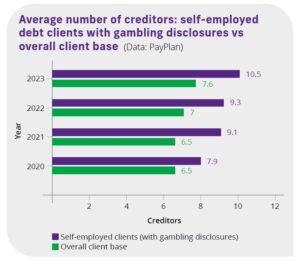
When most people think about business expenses, marketing, payroll, or office supplies come to mind. However, Gambling transactions can be carried out, without swipes or checks, from business accounts at most of the UK’s leading banks.
Through our National Gambling Helpline, GamCare is hearing cases where business funds are located is at staked by employees, company directors, and yourself-Work people – many of them highly vulnerable to gambling-related financial losses because they access to large amounts of money in their business accountsthat must be set aside for ordinary business expenses.
Michelle Franklin, business owner:
“My son gambles from our business account as often as he likes. Our business debit card is linked to several gambling sites. Even though there were thousands of gambling transactions, neither the bank, our bank manager, nor our accountant questioned them; it is simply recorded as a director’s dividend. We lost our home, business, and almost lost our son…”
There is evidence that gamblers who run businesses experience greater levels of debt. PayPlan, one of the UK’s leading debt advice providers, has reported that clients who are self-employed and disclose gambling losses may have more creditors (see graph below) because business status allows them to borrow (and gamble) at a greater rate.
The Business Debtline, a charity that provides free debt advice to small businesses in the UK, also looks at how gambling can negatively impact businesses.
Dawn Jennings, Information Officer at Business Debtline:
“For some of our clients, gambling has put their businesses under greater financial pressure, making it more difficult for them to trade. For others, this simply leads to the closure of their businesses.”
To highlight this issue, GamCare’s Gambling-Related Financial Loss (GRFH) project brings together leaders from financial services companies, debt advisory agencies, the gambling industry, gambling support organizations, as well as people with first-hand experience.
Following this workshop, we are now calling on the business banking sector to take action in the following key areas:
- Increase staff awareness and training
Banks providing business accounts should use the wide range of data they have to better understand the scale of gambling losses across business bank accounts, and analyze how best to predict and prevent gambling-related financial losses.
They must ensure that staff are trained to recognize the dangers of gambling and banking managers are sure to discuss gambling transactions on the account, and can direct clients to gambling support if necessary.
2. Block gambling on business accounts
Although gambling transactions are a personal expense, only a small number of business bank account providers (e.g. Monzo, Tide) currently block gambling transactions, and some others (e.g. Santander, NatWest) offer opt-in gambling blocks at customer request.
Fcompanies must assess the risks of allowing gambling transactions on business accounts and should consider blocking gambling transactions as standard (as is done with credit cards and bank accounts of under-18s).
3. Transaction monitoring to identify gambling losses
Some retail banks in the UK have started to monitor data to identify out-of-pocket gambling and proactively contact customers to offer help and support, however this is not being done in business banking.
Banks that allow gambling transactions in business accounts must use transactional data to identify malicious gambling in client accounts (e.g monitor repeated and increased gambling spend or gambling across multiple gambling operators) and flag these accounts for further intervention.
4. Intervention and support
Detection without appropriate intervention is largely ineffective and bBusiness banks are well positioned to prevent foreseeable losses and support their customers experience gambling losses.
Banks must communicate to business customers about the dangers of gambling in a sensitive, non-judgmental and supportive manner. Companies should normalize conversations about the dangers of gambling in the business banking sector to help break the stigma around the topic and provide resources and education about the risks of gambling that are tailored to business customers, for example through websites, banking apps, direct communication with customers.
Companies should work closely with the gambling support sector and people with real experience to develop these processes and interventions.



